Article
Prisoners in Topeka coding a brighter future for themselves
Feb 8, 2020
They spend all day studying coding, learning new languages and the intricacies of developing successful websites, hoping one day…
Feb 8, 2020
They spend all day studying coding, learning new languages and the intricacies of developing successful websites, hoping one day…
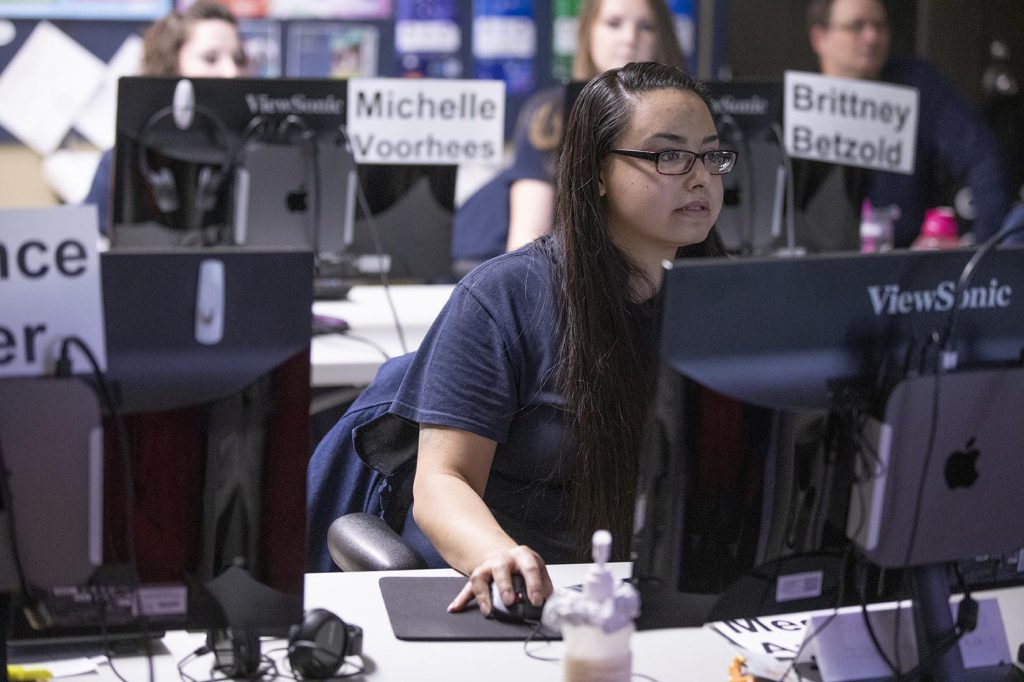
They spend all day studying coding, learning new languages and the intricacies of developing successful websites, hoping one day to land lucrative jobs in the tech industry.
But when they walk out the door of the classroom, these 12 women don’t head home to a cozy apartment or shaded house on a residential street.
Their yard is ringed not by a picket fence, but by a tall mesh enclosure bearing razor wire both at the summit and ground level.
Some of these students will be calling Topeka Correctional Facility home for only a few more months. Others will be here for many more years.
All of them, however, see coding as a fresh start, a ray of hope in a life that landed them behind bars.
“This experience has been very uplifting, just knowing we have a future outside of here,” said Brittney Betzold, 28, who was convicted of child abuse and second-degree murder and is eligible for parole in 2023.
Betzold and her classmates will formally graduate from the prison’s first coding class on Feb. 28. A second class of 15 inmates will begin in March.
“This experience has been very uplifting, just knowing we have a future outside of here.”
Brittany Betzold, The Last Mile, coder, programmer
The women’s prison in Topeka is the first in Kansas to work with The Last Mile, a non-profit organization that works with inmates at men’s, women’s, and young adult correctional facilities around the country to help them build relevant skills in technology so that they can more easily transition to productive employment once they are out of prison.
Launched in 2010 at San Quentin in California, The Last Mile has thus far expanded to Kansas and three other states.
“Being able to bring a high-tech computer coding program to our offenders at Topeka Correctional Facility has been extremely valuable,” said Rebecca Witte, public information officer for the Kansas Department of Corrections. “The coding program has given KDOC the opening to collaborate with numerous tech companies to build pathways into employment for graduates of the program.”
Related Story
Where the inmates are as they prepare to graduate compared to where they were as the class began is nothing short of amazing, said Kelly Potter, Contract Manager of Education for the Kansas Department of Corrections, who oversees inmate education programs.
Potter called it “a transformation.”
“These ladies support each other,” she said. “They’re a team. They help each other to be successful. These are women you typically wouldn’t see talking to each other on the grounds.”
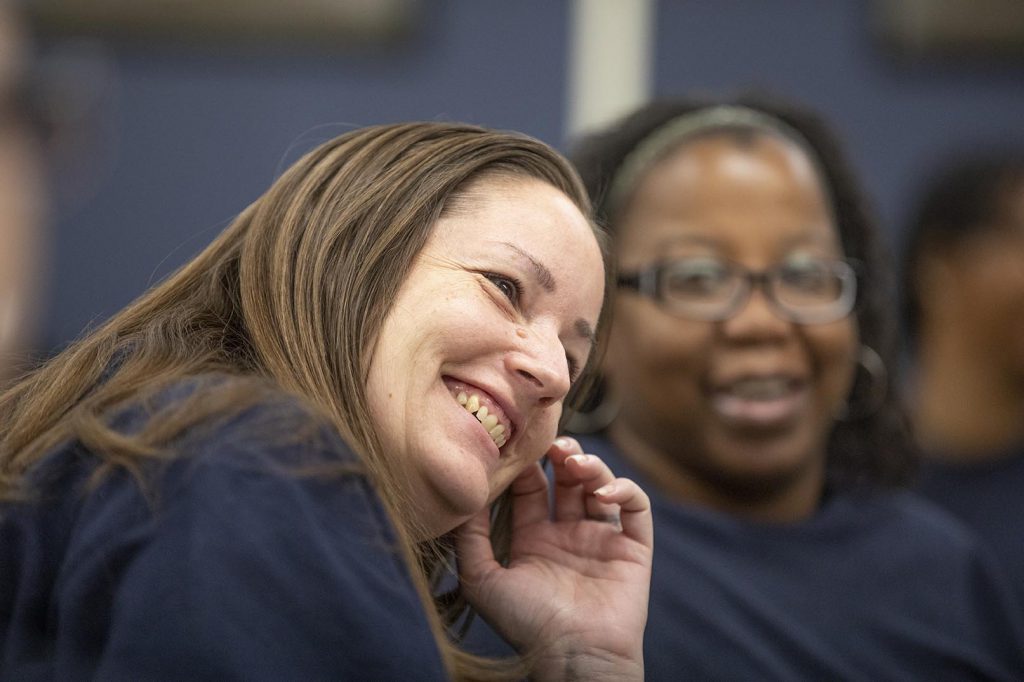
Inmates chosen for the program had to have a clean disciplinary record for the past year and pass an essay test, a logic test and a face-to-face interview, Potter said. They also have to have a G.E.D. or high school diploma.
Those are difficult hurdles for many inmates, said Brett Young, who is a programming, web design and technology instructor for Greenbush, the Southeast Kansas Education Service Center. Greenbush works with Topeka Correctional Facility in providing education opportunities for inmates.
More than half of the inmates coming through the prison’s reception and diagnostic unit don’t have a high school diploma, Young said, and inmates with a history of drug use struggle to focus.
Along with the extensive array of tests they must pass, Potter and Young say, inmates vying for a seat in the coding class have to take responsibility for why they are in prison.
“As an employer, I don’t want to be sitting across the table from somebody and they’re blaming the system, they’re blaming everybody (else) why they were incarcerated,” Potter told the group during a recent class. “You all took ownership and that’s important.”
Five of the inmates in the class will be released from prison in 2020. Three plan to move to the Kansas City area, where they can expect to be in high demand. There are an estimated 3,500 tech jobs available in the Kansas City area.
One of the mission pillars for Flagship Kansas is supporting workforce training and education programs. Flagship is working to help connect inmates who have graduated from The Last Mile with tech jobs near where they’ll be living and working in Kansas once they’re released.
“As an employer, I don’t want to be sitting across the table from somebody and they’re blaming the system, they’re blaming everybody (else) why they were incarcerated.”
Kelly Potter, Contract Manager of Education, Kansas Department of Corrections
A number of potential employers, including Koch Industries, will have representatives at the graduation ceremonies later this month.
Rebecca Beach had “never touched a computer” before being accepted into the class and admitted she “went home crying a lot” early in the class.
“I did not know how hard it was going to be to learn it,” said Beach, 42, who may be released in July providing her parole is approved after serving 20 years for convictions of first-degree murder and attempted second-degree murder in the shooting of two people during a drug deal in Wyandotte County in 2000.
But now she likens coding to “decorating a house.”
”I deserve this and I want this,” said Beach, who plans to settle in the Kansas City area upon her release.
Beach wasn’t alone with her early struggles in the class.
“I really didn’t know what I was getting myself into, but I absolutely love it,” said Megan Asebedo, 28, who will return home to Garden City upon her release from prison later this year.
She was convicted in 2015 on two drug charges and aggravated child endangerment.
Michelle Voorhees knew little about the Internet when she heard about The Last Mile program, let alone coding.
“The internet was this kind of magical thing that I’d never given any thought process to how it gets to people,” she said. “I thought it was on a satellite or something.”
Voorhees was 21 when she was convicted of second-degree murder, aggravated arson and aggravated burglary in connection with the smoke inhalation death of a 36-year-old woman in a house in Chanute. During her trial, prosecutors said Voorhees and her boyfriend went to the house to retrieve property stolen from Voorhees. They then ran out of the house after her boyfriend placed a pipe bomb on a mattress and lit the fuse. The bomb didn’t explode, but it set fire to the house.
Voorhees is 28 now and won’t be eligible for release until 2033.
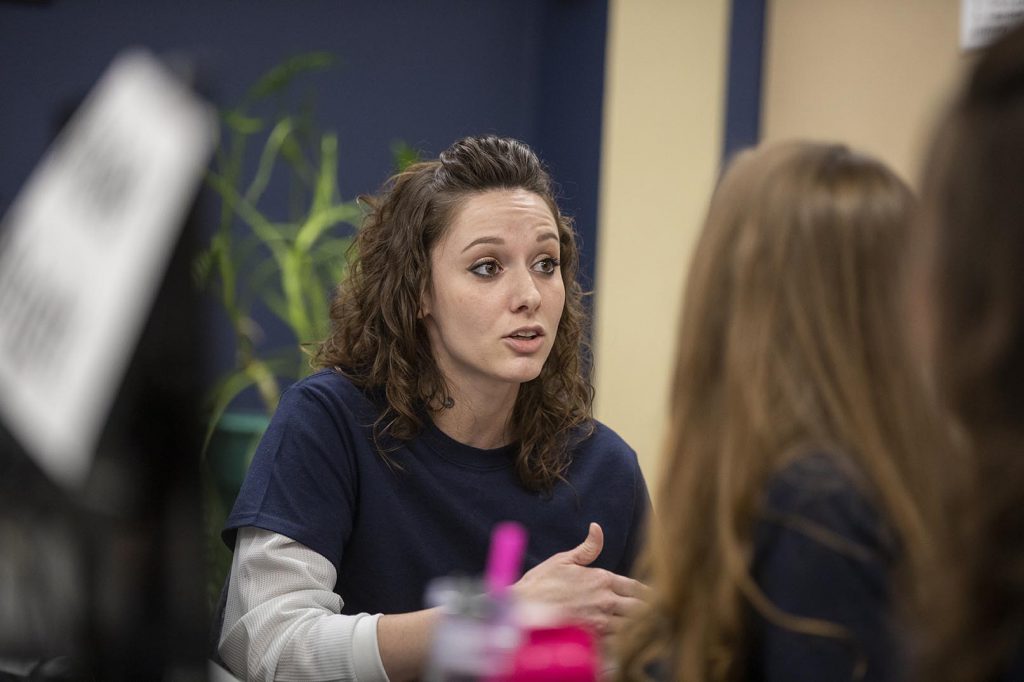
“A real fear for me is I’m going to be 42 years old (when released), out of workforce 20-plus years, I will have no Social Security credits earned, no nest egg, my children will probably have (my) grandchildren, I will have financial responsibilities,” she said. “That’s terrifying. That’s so scary to think that you’re going to be released from prison in your 40s and have nothing.
“So any opportunity I had, I grabbed onto.”
Inmates have other opportunities to earn wages while in prison, such as making cabinets or building mattresses, for what amounts to the minimum wage.
“But that’s not a career,” Voorhees said. “I don’t want to be working at Walmart at 65. That sounds awful. The skill set that we’re being exposed to in here is invaluable.”
A native of southeast Kansas, Voorhees comes “from a long line of poverty, addiction and lack of education.”
That history is so pervasive in her family, Voorhees said, that her younger sister is the first in her family to graduate from high school.
“Ambition isn’t really taught at a small community” like the one she grew up in, “especially when drugs are part of it. Their idea of a dream job is working in a refinery.”
Voorhees had been in and out of foster care since she was a small child, dropped out of school at a young age and had two children by the time she was 17. Complications related to those pregnancies led to difficult surgeries and a resulting opioid addiction “that blossomed into an addiction of everything,” she said.
“It’s a really insidious thing,” Voorhees said of opioid addiction.
“I was kind of thrown off the road I needed to be on to succeed and this program has given me an amazing opportunity to be on that road,” Voorhees said. “I had what it took to be able to succeed. I just didn’t have the resources I needed to do that.”
The coding class “really helped me understand what I was capable of,” she said.
But it didn’t come easy at first.
“There’s so much to learn,” she said. “It’s like drinking the ocean in there.”
Potter called Voorhees a prime example of how The Last Mile can transform lives.
“If she were to get out tomorrow, she could be making six figures” because of her skill level, communication style and capabilities, Potter said.
“She will have so much to offer moving forward with this,” Potter said. “She minimizes the stereotype of what an offender looks like.”
Once the first class graduates, Witte said, a development shop will be opened inside the prison. The state will employ several of the new graduates to build and develop content for other state agencies.
“This will give the incarcerated ladies more opportunities to continue building on the skills they learned through The Last Mile, making them more marketable to employers upon their return to their communities,” Witte said.
Some of the income that inmates earn as coders will go toward the cost of room and board as well as any restitution, fines, fees and child support. The rest will be set aside in a savings account that they can take with them upon their release.
The Last Mile program has Shecora Clanton dreaming, too.
She wants to be an entrepreneur and already has four different businesses she wants to start when she is released next year.
“It might sound far-fetched, but going to prison was the best thing that ever happened to me,” said Clanton, who is now 40.
Clanton was convicted of first-degree murder and conspiracy to commit murder in the 2001 death of a woman who was attacked, stabbed and then run over by a rental truck. A Kansas Supreme Court ruling stated Clanton’s boyfriend was convinced the victim was involved in the death of his sister and wanted to kill her in retaliation.
“If I hadn’t come to prison, I could have been dead,” Clanton said. “My life would really have been messed up.
“I have changed dramatically” in prison. “My mindset, my thought process, the people I hang around with, the things that I’m doing here now…I’m determined to do great things when I get out. When I was out on the street, I wasn’t like that.”
No student in the class may have made greater strides with her confidence between her first day and her graduation, Potter said, calling her growth “amazing.”
“I had to learn how to figure it out on my own, instead of being shown or told how to do it,” said Clanton, who was reduced to tears as she described her journey. “I really struggled with that.”
She also learned it’s okay to ask for help – something she wouldn’t do out on the street.
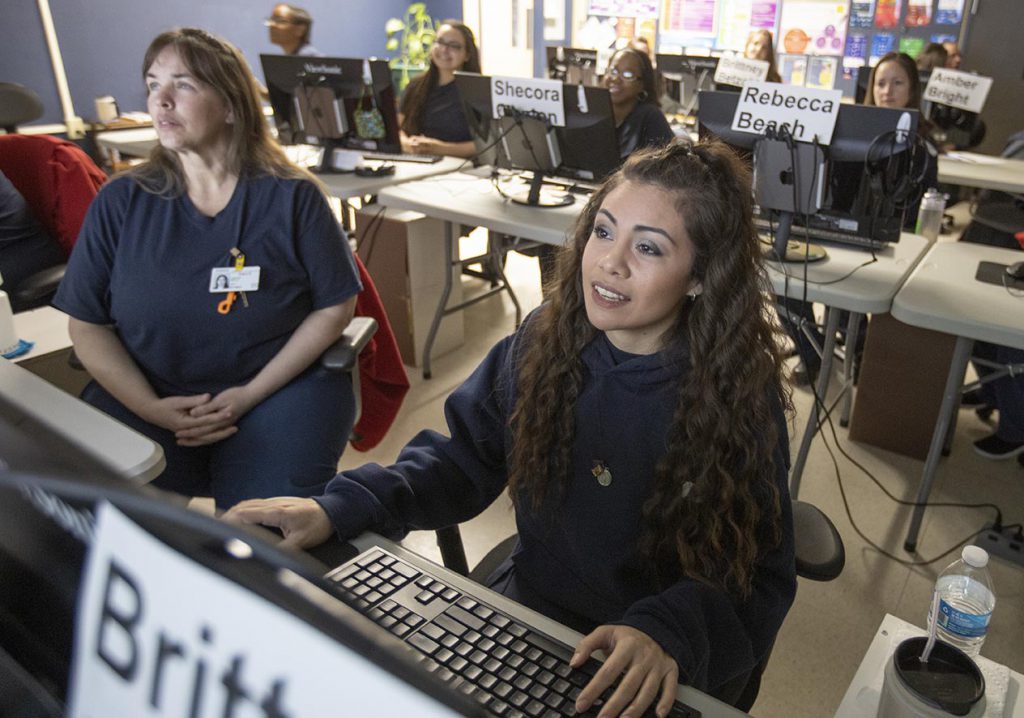
Brittany Leija, 26, will be released early in 2021 after serving more than two years for convictions of burglary and aggravated battery. When she first arrived in Topeka, “I had a sense of failure and ‘Dang, this is it – my life is over,’” she said. “It was really discouraging.”
But as she read self-help books, her outlook improved. Her emotional intelligence grew, she said, and she developed empathy for others.
“It not only changed my mindset, it changed my vocabulary as well,” Leija said. “I can still be great regardless of the circumstance I’m in.”
The coding class has been a revelation for her as well, she said.
“I discovered how much I love to learn – the little victories of, ‘if that doesn’t work, keep trying and getting it right eventually,’” Leija said. “The sky’s the limit. If I can learn this, then I can learn anything if I set my mind on it and stay focused on it.”
Perhaps the most valuable lessons and skills gleaned from the coding course, Nicole Zuspann said, are ones that don’t necessarily show up on a test form.
“The soft skills, as well as the learning to take that creative, constructive criticism with a smile on your face and say, ‘OK, let me try it your way and see how that works,’” said Zuspann, 47, whose extensive criminal history includes forgery and theft.
She’s scheduled to be released later this year.
“I’m going to leave here an unstoppable force. I’m absolutely going to be successful.”
Michelle Vorhees, The Last Mile, coder, programmer
“Every single person in this room has a different way to get to the exact same spot where we’re supposed to be,” Zuspann said of the coding class. “Communication skills have become absolutely necessary in this classroom.”
Like many in the class, Zuspann says she’s “reinventing” herself to give her a better chance of succeeding once she’s released from prison.
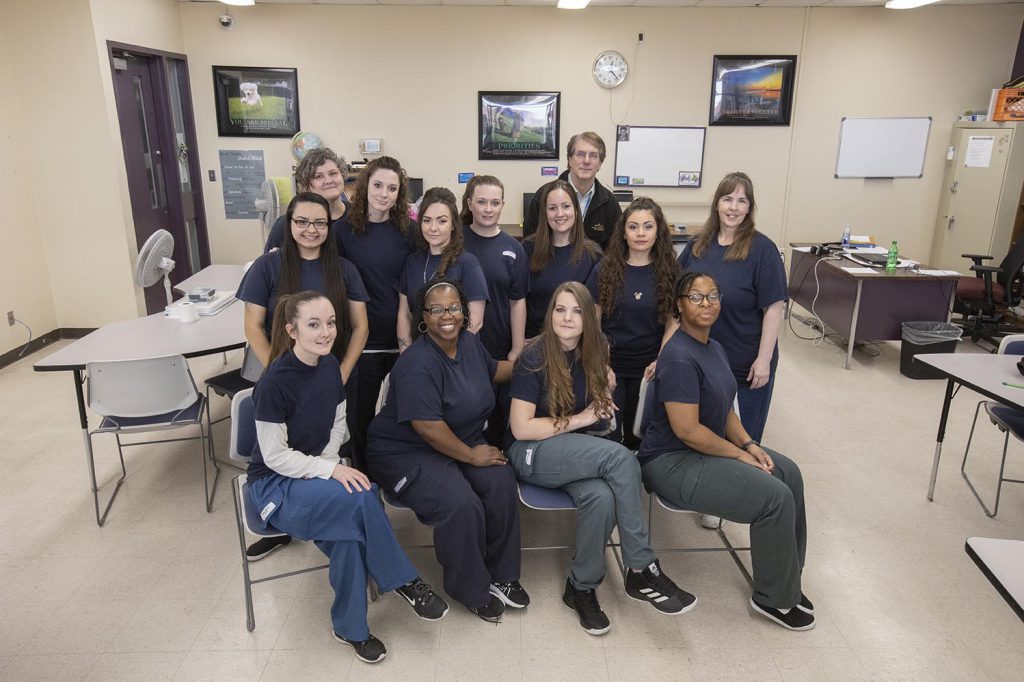
Tiplance Walker plans to set up a website to help inmates with that transition back into society once she’s released in 2026.
“I want to make a networking community for ex-felons where we can encourage one another,” said Walker, 35, who was convicted of second-degree murder and two counts of child endangerment in the 2015 death of a woman following an argument at a party in south Wichita.
The Last Mile “is the first program that I did (while incarcerated) that gave me the opportunity to think about where I would be in the future as far as a career and as a mother that provides for her children.”
Tiplance Walker, The Last Mile, coder, programmer
Like Leija, Walker has shifted her mindset in prison.
“How can I maximize this time to my full potential, utilizing the resources that are available here?” she asked.
The Last Mile “is the first program that I did (while incarcerated) that gave me the opportunity to think about where I would be in the future as far as a career and as a mother that provides for her children,” she said.
For all they have learned, inmates said, the takeaway they value most from The Last Mile program is something that’s difficult to quantify: a belief in themselves.
“I’m going to leave here an unstoppable force,” Voorhees said. “I’m absolutely going to be successful.”